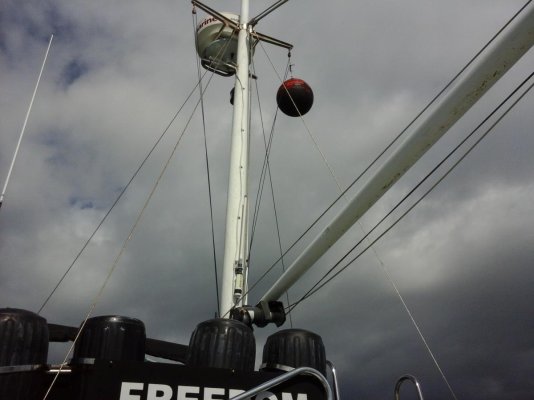When in doubt, read the actual rule:
International Regulations for Preventing Collisions a Sea, 1972 "COLREGS"
Rule 34
Manoeuvring and Warning Signals — International
(a)
When vessels are in sight of one another, a power-driven vessel underway, when manoeuvring as authorized or required by these Rules, shall indicate that manoeuvre by the following signals on her whistle:
— one short blast to mean “I am altering my course to starboard”,
— two short blasts to mean “I am altering my course to port”,
— three short blasts to mean “I am operating astern propulsion”.
k) In the Canadian waters of a roadstead, harbour, river, lake or inland waterway, a power-driven vessel of 12 metres or more in length that is leaving a dock or berth shall give a signal of one prolonged blast unless
(i) the vessel is a ferry making a scheduled departure from a dock or berth from which more than six daily scheduled departures are made,
(ii) the visibility is not less than 3 miles, and
(iii) the master of the ferry has used all available means appropriate to the prevailing circumstances and conditions to determine if the signal is needed for a safe departure and has determined that it is not.
As has been noted above, almost no one actually observes this rule, but if ever in a situation of poor visibility, it is a better practice to use the horn as "required" and so avoid the possibility of an "At Fault" collision.
International Regulations for Preventing Collisions a Sea, 1972 "COLREGS"
Rule 34
Manoeuvring and Warning Signals — International
(a)
When vessels are in sight of one another, a power-driven vessel underway, when manoeuvring as authorized or required by these Rules, shall indicate that manoeuvre by the following signals on her whistle:
— one short blast to mean “I am altering my course to starboard”,
— two short blasts to mean “I am altering my course to port”,
— three short blasts to mean “I am operating astern propulsion”.
k) In the Canadian waters of a roadstead, harbour, river, lake or inland waterway, a power-driven vessel of 12 metres or more in length that is leaving a dock or berth shall give a signal of one prolonged blast unless
(i) the vessel is a ferry making a scheduled departure from a dock or berth from which more than six daily scheduled departures are made,
(ii) the visibility is not less than 3 miles, and
(iii) the master of the ferry has used all available means appropriate to the prevailing circumstances and conditions to determine if the signal is needed for a safe departure and has determined that it is not.
As has been noted above, almost no one actually observes this rule, but if ever in a situation of poor visibility, it is a better practice to use the horn as "required" and so avoid the possibility of an "At Fault" collision.
Last edited:

